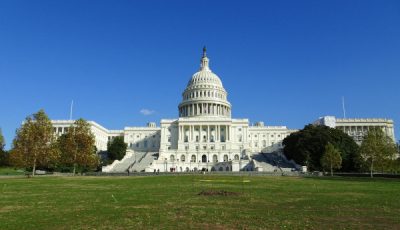Should the Adult Industry Embrace Regulation?
 LAS VEGAS – As is always the case following a transition of Presidential power in Washington, here at the dawn of 2017 the adult industry finds itself wondering what the years ahead might bring in terms of increased obscenity prosecution, new regulations, or yet another revision 2257.
LAS VEGAS – As is always the case following a transition of Presidential power in Washington, here at the dawn of 2017 the adult industry finds itself wondering what the years ahead might bring in terms of increased obscenity prosecution, new regulations, or yet another revision 2257.
Working the assembled industry crowd at the AVN Adult Entertainment Expo, former porn performer Aurora Snow seems to have encountered a lot of nervousness and trepidation concerning President Donald Trump — and whether he might take seriously the “children’s internet safety” pledge he signed while a candidate.
On the state level, meanwhile, more legislatures appear poised to join Utah in declaring porn a public health crisis, and while such measures are largely symbolic, a proliferation of this sort of resolution could build legislative momentum that culminates in new regulations or stricter enforcement of existing ones.
While the defeat of California’s Proposition — the so-called “condoms in porn” law — fended off several potentially problematic developments for the industry and individual producers (not the least of which was the prospect of being sued by random California porn viewers for alleged violations of Cal/OSHA regulations), the outcome of the vote didn’t magically cause the underlying regulations to disappear, obviously.
On top of the above, ongoing widespread piracy of content and the growing general expectation on the part of consumers that porn is (and should be) free contributes to a market environment that is challenging, to say the least.
For the sake of argument, let’s say the new administration gets together with Congress and — consistent with the terms of the pledge Trump signed — crafts legislation designed to require all online porn to be placed behind a paywall. Setting aside for the moment the difficulty of coming up with language that could survive court scrutiny where past efforts have failed, is the general idea of a “digital blinder rack,” as some call it, a development the industry should resist, or embrace?
Historically, the reflexive posture of the adult industry to any sort of regulation has been one of staunch resistance. This is understandable, of course, given the nature of many of the regulations that have been proposed, as they’re often drafted carelessly with respect to their impact on technological development, the immense scope of online material they cover and the retarding effect they could have on the ability of companies to operate profitably should such a proposal become effective law.
What if, however, Congress were to establish a law requiring any site that accepted traffic originating from the United States to keep all pornography available to such visitors behind a paywall, blocking and filtering sites that did not comply, leaving for-purchase pornography as the only option for domestic consumers?
Even without polling them, I can tell you this idea would have some appeal to many old-school porn producers and studio operators, many of whom began fretting over the negative impact of free online porn long before the first tube site shot to the top of the list of the world’s most trafficked websites.
These old-schoolers didn’t understand the emerging internet particularly well as a technological entity, but their intuition was to see the web as a potential threat. They saw how easy access to free porn online could disrupt a market built on the artificial scarcity of its central product — scarcity informed, in large part, by laws restricting the distribution and display of porn to adults by regulating the means and venues by which it could be legally distributed.
Many others in the industry, especially those who operate the most popular tube sites, would have a different reaction to such an idea, naturally. The lifeblood of their sites is traffic, and American porn surfers figure heavily in their overall daily take.
Whatever its innate appeal to those who bemoan the passing of a time when consumers paid upwards of $50 for a single porn title on VHS, the idea of legally forcing the free porn genie back into the bottle would face roadblocks that go well beyond the ability to survive a challenge from the ACLU. Savvier web surfers already know about various options for masking their point of origin, giving them a means of circumventing blocks based on the geographic origin of incoming traffic. Rogue site operators who live in jurisdictions where the U.S. has little to no influence would ignore the law and bounce from IP address to IP address, much like popular pirate sites targeted by the Motion Picture Association of America and the Recording Industry Association of America already do to keep operating despite constant international efforts to shut them down.
As UCLA professor and First Amendment expert Eugene Volkh noted when the George W. Bush administration was contemplating a major crackdown on internet porn, even if such a crackdown were possible, there’s the more fundamental question of whether it would accomplish anything toward the goals stated by legislators who consider porn a public health crisis. Even 13 years later, with all the changes in policy, perception and technology that have taken place in the intervening years, Volkh’s analysis is worth quoting at length.
“We really have three possible outcomes,” Volokh wrote of the sort of extensive filtering, blocking and prosecuting regime a real “crackdown” on internet porn would require. “(1) The crackdown on porn is doomed to be utterly ineffective at preventing the supposedly harmful effects of porn on its viewers and on the viewers’ neighbors. (2) The crackdown on porn will be made effective — by implementing a comprehensive government-mandated filtering system run by some administrative agency that constantly monitors the Net and requires private service providers to block any sites that the agency says are obscene. (3) The crackdown on porn will turn into a full-fledged War on Smut that will be made effective by prosecuting, imprisoning and seizing the assets of porn buyers.”
Framed in those terms, would even the most socially conservative voter, legislator or web surfer truly favor the measures described? Even if you agree porn is a “public health crisis,” is it one of sufficient urgency to justify fundamentally undermining the bedrock principles of free speech and personal liberty that really do “make America great”?
None of this means the industry should fight tooth and nail against every law and regulation under the sun because it might have an impact on the porn business. But I’d argue the onus is on the legislative branch, at both the state and federal levels, to come up with a way to address the “crisis” by some other means. So far, attempts to address it with legislation have ranged from the purely symbolic to the doomed to fail in court — not an encouraging track record by any measure.
If the concern is online porn warping young minds unprepared to encounter it, why not encourage sexual education at a younger age? (Granted, that idea probably won’t fly in Utah.) How about funding educational campaigns that encourage parents to hold off on giving their kids internet and camera-enabled smartphones until they’re more prepared for the world such devices unlock?
Whatever new regulations or enforcement measures may come, the tension between the open nature of the internet and the understandable, natural desire on the part of adults to shepherd their children through their early years isn’t going away.
While porn gets all the headlines, there’s plenty of other online content for parent to worry about, from terrorist recruitment propaganda and hate group rhetoric to how-to instructions for everything from bomb building to the manufacture of mind-altering chemicals.
As a practical matter, the world can’t legislate these things out of existence, regardless of how much they may threaten public health. It might just be time for legislatures to recognize this fact, and contemplate other paths by which they can reduce the harms that concern them.
One Comment
Leave a Reply
You must be logged in to post a comment.














Pingback: Should the Adult Industry Embrace Regulation? – TripleXers Blog